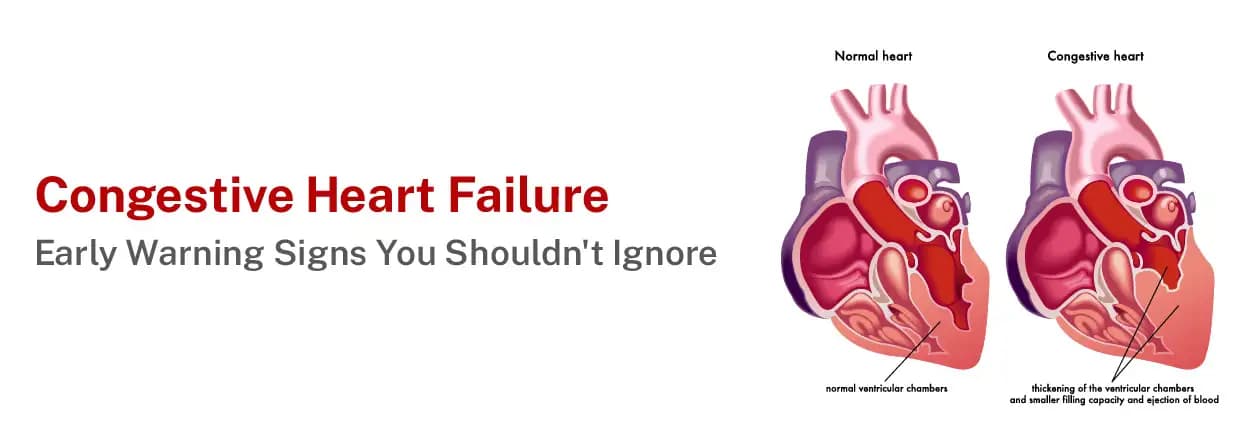
Congestive heart failure disease, or heart failure, is a medical condition in which your heart can't pump enough oxygen-rich blood to cater to your body's needs. Due to which, your heart can’t hold as much blood as it should, and blood pools in other parts of your body parts, like lungs, feet, and legs, that cause breathing problems.
In India, heart health is becoming a growing concern these days. So, If you or any of your family members are facing any health issue, book an appointment with the best cardiologist at BM Birla Hospital, Kolkata.
The Business Today report shows a rise in heart-related insurance claims on Policybazaar.com, increasing from 9-12% in 2019-2020 to 18-20% in 2023-2024. This reflects the growing cases of cardiac issues, including conditions like congestive heart failure (CHF).
Heart failure doesn’t happen overnight. It begins with several symptoms, like tiredness, breathlessness or even swelling. Such signs might seem minor at first, but they might be early warning signs of congestive heart failure (CHF). But if you recognise these symptoms at an early stage, you can take preventive measures accordingly. So, let’s understand what congestive heart failure is, it’s early symptoms and risk factors.
So, let’s dive in!
Heart failure doesn't mean your heart has stopped or is about to stop beating. Congestive heart failure disease, or heart failure, is a medical condition in which your heart can't pump enough oxygen-rich blood to cater to your body's needs. Due to which, your heart can’t hold as much blood as it should, and blood pools in other parts of your body parts, like lungs, feet, and legs, that cause breathing problems.
|
Right-sided heart failure. |
This means your heart is too weak to pump enough blood to your lungs to get oxygen. |
|
Left-sided heart failure |
It is a condition where your heart can't pump enough oxygen-rich blood out to your body. |
|
High-output heart failure. |
This is a rare condition of congestive heart failure. This occurs when your heart cannot pump enough blood to meet the body's needs, even when it's initially working normally. |
There are certain conditions that lead to congestive heart failure, including
These conditions gradually leave the heart too weak or stiff to fill and pump blood properly.
Various factors might be responsible for heart failure, including:
Other medical conditions that may also lead to heart failures, like high blood pressure, diabetes, obesity, sleep apnea, chronic kidney disease, anaemia, and iron overload disease, can increase your risk.
The symptoms of congestive heart failure may develop slowly and include:
Sometimes, you may experience mild symptoms of congestive heart failure or none at all. But it doesn’t mean that you no longer have heart failure. Heart failure symptoms can range from mild to severe and may come and go. Unfortunately, these congestive heart failure symptoms get worse over time.
Congestive heart failure is a serious condition, but early detection can make a big difference. Recognising warning signs at an early stage, like persistent fatigue, swelling, or breathlessness, helps you to take action before the condition worsens.
Your heart works hard for you every day, so just take a moment to listen to what it might be telling you. Don’t wait for symptoms to escalate. Schedule regular check-ups, stay informed, and prioritise your health. If you’ve noticed any unusual changes, then it’s time to consult with a cardiologist near you. To book an appointment with our cardiologists, click here (Booking link)
The four stages of congestive heart failure are:
Stage A: where there’s a risk of heart failure but no symptoms yet.
Stage B: where heart damage is present but still no noticeable symptoms.
Stage C: where symptoms like fatigue, swelling, or shortness of breath start appearing.
Stage D: which involves severe symptoms even at rest, often requiring advanced treatments or care.
To reduce swelling in your feet, you can try elevating your legs whenever you sit or lie down. You can follow a low-sodium diet to minimise fluid retention and wear compression socks to help control swelling. Staying gently active, like walking, can improve circulation, and taking prescribed diuretics can help remove excess fluid. Always check with your doctor to ensure these approaches are right for you.
Written and Verified by:

Dr. Shuvo Dutta is a Senior Consultant in Cardiology Dep. at BM Birla Heart Hospital, Kolkata, with over 34 years of experience. He specializes in radial and femoral angioplasty, complex cardiac interventions, and was the first in India to perform carotid artery stenting to prevent brain stroke.
Similar Cardiology Blogs
Book Your Appointment TODAY
© 2024 BMB Kolkata. All Rights Reserved.